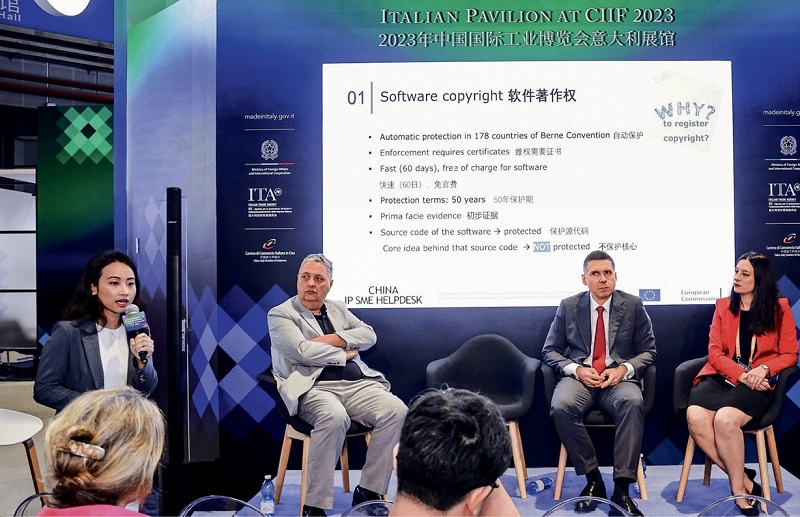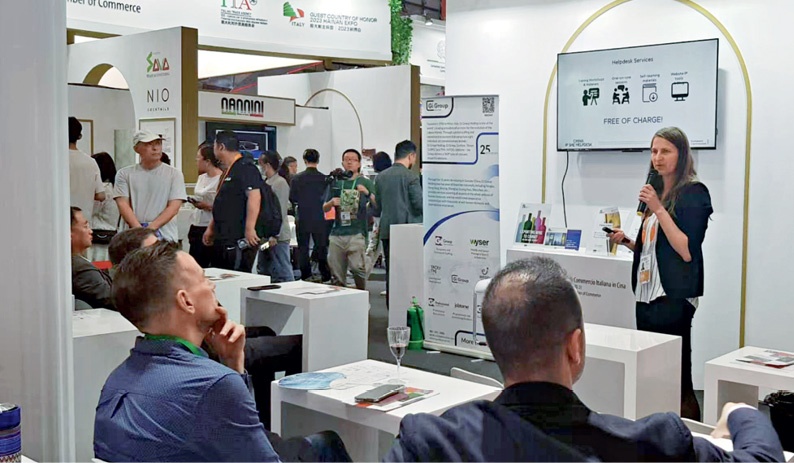China’s enhanced enforcement of intellectual property rights (IPR) protection is key for European SMEs to pursue strategic growth and market expansion.
Opening up is a fundamental state policy of China, holding particular significance in its engagement with the European Union (EU) market.
The EU and China are mutually important trade partners, with their economic interdependence underscored by robust trade figures. As of 2024, China accounted for 21.3 percent of the EU’s total imports, solidifying its position as the bloc’s largest import source, while ranking as the EU’s third-largest export market (8.3 percent of total exports).
As the backbone of the EU economy, European SMEs have been a significant contributor to this growth. With around 20 million enterprises operating across EU markets, these businesses have long recognized the potential of China’s vast consumer base, strategically expanding their operations to capitalize on lucrative opportunities.
However, they face a number of challenges in doing business in China, also due to their limited scale and resources. Among these hurdles, intellectual property rights (IPR) protection stands out as a critical concern, directly impacting investor confidence and the equitable trade environment China seeks to uphold.

Lisa Lu (left) from China IP SME Helpdesk promotes copyright protection literacy among EU SMEs attending the 2023 China International Industry Fair (CIIF) on 20 September 2023 in Shanghai.
Tangible Improvements in China’s IPR Protection
In the 2025 government work report, Chinese premier Li Qiang emphasized China’s continued focus on “expanding higher-standard opening up and stabilizing foreign trade and investment.” To foster a favorable business climate, measures have been implemented to protect the legitimate rights and interests of foreign enterprises, including IPR.
“Intellectual property rights are the drivers of innovation and China’s push for innovation and entrepreneurship has led to noticeable improvements in IPR protection and enforcement which is welcomed by the European SMEs,” noted Helika Jürgenson from Estonia, who is project manager of the China IP SME Helpdesk, a European Commission initiative designed to provide first-line, business-related advice on IPR issues free of charge to European SMEs in China.
The landscape of IPR protection for European SMEs in China has evolved a lot in recent years, especially over the past decade. As Jürgenson summarized, key legislative milestones include revisions to the Trademark Law, Copyright Law, and Patent Law, which introduced higher statutory damages for infringements, streamlined enforcement procedures, and increased punishment on bad-faith trademark registrations.
China’s accession to the Hague Convention in 2023 marked another leap forward, simplifying international design filings and enabling design protections – a boon for the tech firms safeguarding user interfaces.
“These updates reflect China’s efforts to align its IP system with international norms while growing responsive to the needs of both domestic and foreign businesses, as well as cutting-edge technological developments, such as AI-generated content and digital streaming platforms,” she added. In this way, an ecosystem where laws evolve alongside economic and technological shifts came into being.
However, despite legislative progress, European SMEs expect to see policy improvements materialize more quickly. A recent survey by the China IP SME Helpdesk reveals that to confidently do business in China, most SMEs express their need to feel safe and be safe, sure that their rights are protected, and assured of coverage of losses caused by infringements. This is even more important as SMEs cannot afford expensive lawyers to enforce their rights.
“With all the advancements made, there’s still a time lag between legislative upgrades and tangible improvements in SMEs’ experiences,” she noted. “We are looking forward to more improvements.”
Improving IPR Awareness of European SMEs
“China is a major market, pretty much one of the biggest markets in the world for companies. European SMEs are of course interested in doing business here, many do find the opportunities in China, but there are also many challenges,” Jürgenson told China Today.
When it comes to IPR related issues, Lisa Lu from China, who is IP business advisor of China IP SME Helpdesk, mentioned that IP enforcement remains a costly, time-consuming, and complex undertaking even for big European companies, let alone SMEs, and often the damages awarded do not cover the losses suffered. Therefore, her major focus is to help SMEs prepare in advance through the helpline, which is one of the core services offered by her organization.
In her daily work, it became apparent to her that many SMEs were not aware of all the IP they possessed and unsure of how to protect it. Someone might have wanted to know more about the patent system in China, but was unaware of the importance of trademark or design protection. Therefore, if they have the proper knowledge about the IP landscape in China, how it functions, and how to register themselves, and prepare everything in advance, then the companies can make those business decisions early on before they enter the market.
Jürgenson nodded in agreement. “Big companies have their legal department, so they don’t need us to provide advice. But for SMEs, especially family-owned SMEs, such as wineries and producers of sausages, cheese, and some agricultural products, they lack the resources to hire defense lawyers and acquire marketing consultants,” she added. “We offer free of charge services that provide the SMEs with constructive and comprehensive business advice and raise the SMEs’ IPR awareness and better prepare them for the market entry.”
The Helpdesk organizes training seminars, workshops, and webinars to reach out to as many businesses as possible. They also attend trade fairs across China, offering services to more European SMEs.
Trade fairs play a crucial role in helping European SMEs establish connections and understand market dynamics when trading with China. These events serve as key venues for meeting clients and business partners, gaining insights into industry trends and competition, and identifying potential IP infringements. As such, trade fairs are strategic locations for the Helpdesk to provide training and assistance. “There are a lot of trade fairs that European SMEs try to visit, the biggest being the CIIE in Shanghai. Most European SMEs would go there, and then go to their sector-specific ones, such as SIAL, the biggest fair covering food and beverages, held in Shanghai and Shenzhen, and the China High-tech Fair in Shenzhen. The majority of European SMEs doing business in or with China are from the food and beverages industry. We are there every year, meeting and talking to companies that are trying to enter the Chinese market in every sector,” Jürgenson elaborated.

Helika Jürgenson (right), project manager of the China IP SME Helpdesk, at the China International Consumer Products Expo (CICPE) in Hainan on April 12, 2023.

Guiding SMEs through IP-Related Issues in China
Last year, at a symposium on IPR protection of foreign-funded enterprises organized by the China National Intellectual Property Administration, its director Shen Changyu stated that the administration will help solve the practical difficulties and problems encountered by foreign-funded enterprises in intellectual property, and provide more targeted services to create a good environment for the development of foreign-funded enterprises in China.
While the Chinese authorities have doubled their efforts in cracking down on counterfeiting, many SMEs still feel deterred by infringement stories when trying to enter the market.
“Staying well-prepared in this regard is very important. The stories of failure we hear often could have been avoided if the SMEs had taken steps in advance to protect their IPR. On the flip side, European SMEs that have participated in our training seminars and take appropriate steps to protect their IPRs, often share their success stories,” Jürgenson further added.
In 2021, Dutch health-tech startup InMotion VR, specializing in virtual reality solutions for physical therapy, achieved a strategic milestone by securing its first major client in Hong Kong, marking its entry into Asian markets. While this partnership positions Hong Kong as both their largest and inaugural Asian client, the company anticipates a gradual expansion of opportunities across the region.
Recognizing the risks of operating in unfamiliar jurisdictions, InMotion VR proactively safeguarded its IP in Europe through copyright registrations, trademark protection (covering the company name, products, and logo), and design patents for its graphical user interface. To navigate China’s complex IP landscape, the firm consulted the China IP SME Helpdesk, gaining critical insights that IP protection in China requires separate registrations across four distinct legal systems: China’s mainland, Hong Kong, Macao, and Taiwan.
Faced with these complexities, InMotion VR prioritized filings in China’s Hong Kong (its operational base) and mainland. This decision addressed two strategic risks: proximity-driven counterfeit threats from the mainland and potential “bad faith” trademark registrations that could block future market entry. By securing cross-jurisdictional IP rights, the InMotion VR positioned itself to safely scale operations while mitigating legal vulnerabilities in Asia’s high-growth markets.
The case underscores the necessity for SMEs to customize and adjust IP strategies when expanding into China’s multi-jurisdictional market, balancing immediate operational needs with long-term regional ambitions.
Both Jürgenson and Lu agreed that to keep seeing more success stories, there is a need to work harder and collaborate with business support organizations in China and chambers of commerce to better serve the SMEs.